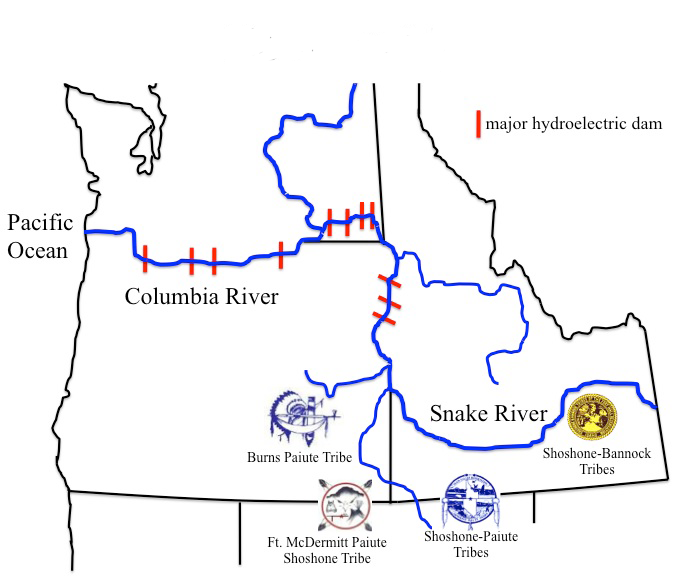
“The Compact of the Upper Snake River Tribes will work to ensure the protection, enhancement, and restoration of natural and cultural resources, activities, and rights of the Compacting Tribes that are reserved by Treaties and Executive Orders, protected by federal laws and agreements, or are the subject of aboriginal claims asserted by the Tribes.”
Restore the Snake River Basin to a natural condition and facilitate tribal unity to protect and nurture all Compacting tribes rights, languages, cultures, and traditions.
Through information gathering and dissemination, facilitation of technical and policy meetings, and drafting of technical and policy statements, USRT coordinates and pursues fish, wildlife, land, water, air, Cultural Resource, and federal trust responsibility objectives and strategies to meet the policy and guiding principles of their Compact.


P.O. Box 219
Owyhee, Nevada 89832
(208) 759-3100
P.O. Box 306
Fort Hall, Idaho 83203
(208) 478-3700
111 North Road
P.O. Box 457
McDermitt, Nevada 89421
(775) 532-8259
Chair – Lindsey Manning, Shoshone-Paiute Tribe
Vice Chair – Lee Juan Tyler, Shoshone-Bannock Tribes
Treasurer – Jody Richards, Burns Paiute Tribe
Member – Andrew Beers, Burns Paiute Tribe
Member – Justina Paradise, Fort McDermitt Paiute-Shoshone Tribe
Member – Dackota York, Fort McDermitt Paiute-Shoshone Tribe
Member – Ladd Edmo, Shoshone-Bannock Tribes
Member – Arnold Thomas, Shoshone-Paiute Tribe
3380 W Americana Terrace Suite 360
Boise, ID 83706
Phone: 208.331.7880




















The USRT shall coordinate and pursue the following objectives and strategies through information gathering and dissemination, facilitation of technical and policy meetings, and drafting of technical and policy statements to meet the policy and guiding principles of the Compact.

Provide technical assistance and coordination of fish, wildlife, and habitat issues to ensure informed decisions by USRT and its member tribes.
Participate in regional forums and other tribal, federal, and state fish and wildlife regulatory and planning processes.
Provide policy and technical analysis of regional and national fish and wildlife issues.
Assist member tribes with local fish and wildlife issues.

Provide technical assistance and coordinate land, water and air issues to ensure informed decisions by USRT and its member tribes.
Assist coordination of activities with tribal, federal, state, and private land, water, and air managers, which impact trust assets and/or tribal cultural properties held in trust by the federal government.
Participate in regional forums and other tribal, federal, and state land, water, and air regulatory and planning processes.
Assist member tribes with local land, water, and air issues.

Provide technical assistance and coordinate Cultural Resource issues to ensure informed decisions by USRT and its member tribes.
Coordinate activities of tribal, federal, state, and private land managers, which impact trust assets and/or tribal cultural properties held in trust by the federal government.
Protect confidentiality of sensitive tribal information.
Participate in regional forums and other tribal, federal, and state cultural resource regulatory and planning processes.
Ensure inclusion of an expanded tribally defined definition of Cultural Resources, which includes tribal language, cultural and traditional values, in decision-making regarding Cultural Resources.

Provide technical assistance and coordinate federal trust responsibility issues to ensure informed decisions by USRT and its member tribes.
Participate in Federal family regulatory and planning processes to provide for protection, enhancement, and restoration of natural and cultural resources.